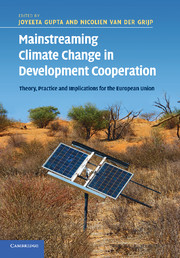 Mainstreaming Climate Change in Development Cooperation
Mainstreaming Climate Change in Development Cooperation Book contents
- Frontmatter
- Contents
- List of contributors
- Foreword
- Acknowledgements
- List of abbreviations
- Part I Introduction
- Part II Theoretical Exploration
- 2 Development and development cooperation theory
- 3 Mainstreaming climate change: a theoretical exploration
- Part III Governance
- Part IV Case Studies
- Part V Conclusions
- Index
- References
2 - Development and development cooperation theory
Published online by Cambridge University Press: 07 May 2010
- Frontmatter
- Contents
- List of contributors
- Foreword
- Acknowledgements
- List of abbreviations
- Part I Introduction
- Part II Theoretical Exploration
- 2 Development and development cooperation theory
- 3 Mainstreaming climate change: a theoretical exploration
- Part III Governance
- Part IV Case Studies
- Part V Conclusions
- Index
- References
Summary
Introduction
Since this book is about development, sustainable development and development cooperation, this chapter examines these complex issues and their interlinkages. While some see development as measurable by gross national product (GNP), others argue that development is much more complex. Whereas sustainable development has been embraced by the scientific community (e.g. the IPCC), the political community (e.g. the Climate Convention and the Rio Declaration of 1992) and the private sector (e.g. as part of corporate social responsibility), its content is often not clear. Although development cooperation appears to be entrenched in the psyche of countries and in international law (Cárdenas et al., 1995), others focus on aid fatigue and call for its ending (Ruyter, 2005).
This chapter examines how the development literature has evolved over time, the evolution of the sustainable-development literature and why most DCs are still developing after 50 years of theory and practice (see Section 2.2). It examines the evolution of the development cooperation literature, the motives for providing assistance, the debate on the effectiveness of aid, the modalities of aid and the problems with aid (see Section 2.3). Finally, it makes recommendations (see Section 2.4) and draws conclusions (see Section 2.5).
Development theory
Introduction
This section discusses the evolution of development theory, the evolution of sustainable development and why popular images about how countries should develop are fading in the light of the reality.
Information
- Type
- Chapter
- Information
- Mainstreaming Climate Change in Development CooperationTheory, Practice and Implications for the European Union, pp. 33 - 66Publisher: Cambridge University PressPrint publication year: 2010
References
Accessibility standard: Unknown
Why this information is here
This section outlines the accessibility features of this content - including support for screen readers, full keyboard navigation and high-contrast display options. This may not be relevant for you.Accessibility Information
- 9
- Cited by